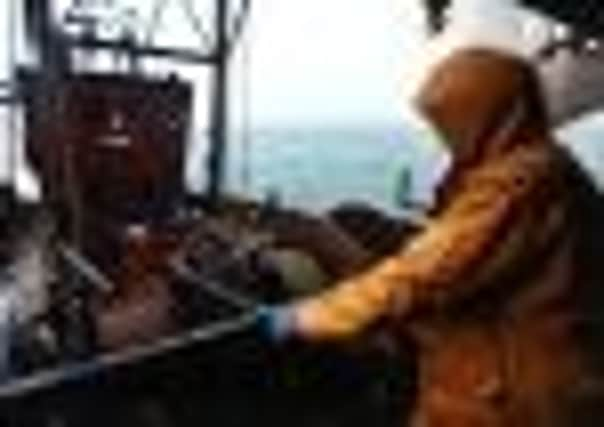Dead fish dumping in European water to end by 2019


In the early hours of this morning European Fisheries Ministers agreed to introduce a phase ban on discards over the next six years.
The ban will begin with mackerel catches - the most valuable single species for Scottish fishermen - next year. It will signal the beginning of the end for a controversial practice which has resulted in an estimated one million tonnes of unwanted fish - almost a quarter of all the fish landed on European boats - being thrown back dead into the sea every year because of quota restrictions.
Advertisement
Hide AdAdvertisement
Hide AdThe introduction of the ban has still to be formally approved by the European Parliament but will be introduced progressively between 2014 and 2019 as part of the reform of the discredited Common Fisheries Policy.
Phased introduction
The ban on some pelagic species, including mackerel, will come into force next year and there will be a phased introduction for white fish species, including cod, from 2016 to 2019 .
Richard Lochhead, the Scottish Fisheries, said the ban would “bring to an end a 30 year scandal.”
And he continued: “This negotiation is a key milestone on the road to a discard free Europe and delivers a compromise plan which is both realistic and workable. No longer will European fishermen be dumping millions of tonnes of fish overboard which is a waste of a valuable food resource to the detriment of our stocks and the industry.
“Fisheries Ministers from across Europe have now given a mandate to the negotiators to reach a final deal with the EU Parliament as part of the reform of the failed Common Fisheries Policy.”
Mr Lochhead added: “It has been a long hard road to achieve agreement towards a package that represents the regional difference across European fleets. And the negotiation was dominated by attempts of some nations to exempt certain stocks by adding in specific loopholes.
“We recognise there is still a challenge ahead for our fleet but they have already shown leadership by reducing discards over the past few years. Now there is more for them to do and a requirement for the rest of Europe to follow. We all need work together to ensure smooth implementation.”
Bertie Armstrong, the chief executive of the Scottish Fishermen’s Federation, gave a cautious welcome to the phased ban.
Problems facing fishermen
Advertisement
Hide AdAdvertisement
Hide AdHe said fishing ministers at the talks had recognised many of the problems facing fishermen in implementing a discards ban in complex mixed fisheries and had taken the first steps in ensuring that the scheme is introduced in a “practical and sensible manner.”
He said: “Ministers seem to have taken care to agree upon a practical plan that would work for the fishing industry and we are pleased that a more realistic timescale for the implementation of a discards plan was agreed. We also welcome the provision for a degree of flexibility in the plan so as to take into account any practical difficulties in implementing the scheme.
“It was also embedded into the agreement that a ban on discards will mean that fishermen can land more fish.”
But Mr Armstrong stressed: “Whilst this agreement is an important first step in ensuring the practical introduction of a discards ban, it should be recognised that huge challenges remain for the industry in its implementation that will require major changes in the way that fishermen operate. The Scottish industry has already made heavy sacrifices in working towards this.
“We note that there has been some criticism from the green lobby on this agreement, but the compromises agreed will assist in the practical implementation of the plan and this should be welcomed. It is very easy to have the luxury to commentate and criticise from the outside, without actually being involved in the practical implementation of the measures.”
‘Steamrolling’
Oceana, the international marine conservation organisation, accused France and Spain of leading a group of countries which had “disappointingly agreed to compromise the principle of a full discard ban.”
Xavier Pastor, executive director of Oceana in Europe said: “Fisheries Ministers are steamrolling the will of the people because they lack the political courage to do the right thing. This decision is just another example of how disconnected they are from the citizens of their own countries, who want to put an end to this shameful practice of wasting fish.”
Richard Benyon, the UK Fisheries Minister, said: “This is a historic moment in reforming the broken Common Fisheries Policy. The scandal of discards has gone on for too long and I’m delighted that the UK has taken such a central role in securing this agreement.
Advertisement
Hide AdAdvertisement
Hide Ad“I am disappointed that some of the measures required to put this ban into place are no longer as ambitious as I had hoped but it’s a price I am willing to accept if it means we can get the other details right.
“The final package will still need to be agreed with the EU Parliament but the result we have achieved today is another step in the right direction and will prove to be good for both fishermen and the marine environment.”